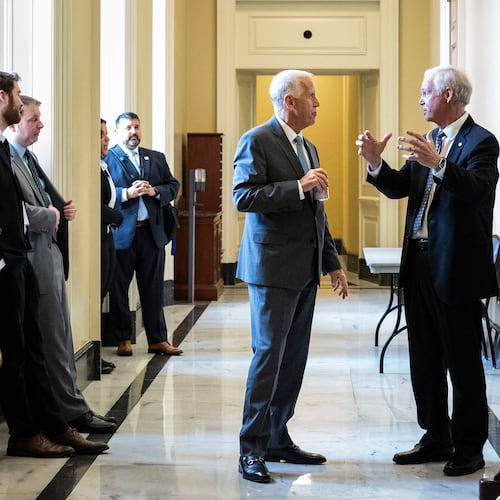At the end of this month, after 34 years as a police officer, I will retire from my position as Atlanta’s Chief of Police.
My tenure was noteworthy for the challenges, opportunities, achievements and joys that mark many long careers.
It is an apt time for me to take stock of what worked, what needs to be improved, and most importantly, share some lessons that I hope will be helpful to those who take up the baton of providing public safety to our citizens.
Credit: Natrice Miller / Natrice.Miller@ajc.com
Credit: Natrice Miller / Natrice.Miller@ajc.com
Atlanta law enforcement has changed dramatically in my three decades:
- Today, we have a police force that looks like the people who live in our city: diverse in race, culture and heritage.
- Women comprise some 17 percent of our sworn officers. And we’re proud that two women climbed ranks to become chief of police.
- More than half the department is Black, and Hispanics are well represented in our ranks.
- Collaboration among the many local, state and federal law enforcement agencies across metro Atlanta has never been better.
- Our police department understanding and embrace of innovative technology has made us better and more effective in deterring and investigating crime.
- The proliferation of guns on our streets has made our job more dangerous, the public more vulnerable, and put the possibility of violence by irresponsible and immature gun owners on a literal hair trigger.
- The job of a police officer – always challenging – is fraught with ever more complexity, including providing social service responsibilities beyond the core of our initial training.
- Those we are sworn to serve have expanded their expectations of policing, necessitating more and better training.
Some things, however, have not changed much:
- Police officers voluntarily step into harms’ way each day.
- Our ability to protect the public remains rooted in the level of support we derive from our elected officials, citizens and communities.
- Nearly half the felony crimes committed continue to be perpetrated by repeat offenders – people who have been arrested, tried and convicted for three or more prior felonies. They are, in effect, professional criminals and they prey on the innocent.
- Esprit de corps – our unity of purpose, embrace of our important mission and a belief that the police department’s essential work has earned the consistent respect of our citizens – undergirds our effectiveness.
- Police officer salaries lag those of the private sector and present a challenge to recruiting.
- Strengthening relationships with disenfranchised communities remains the key to building trust.
The two-year spike in crime which began with the pandemic, gathered momentum in the wake of the George Floyd murder in Minneapolis and resulted in irresponsible and unrepresentative calls to “defund the police” has largely abated. Homicides and aggravated assaults are still too high, but overall crime in back to the historically low levels of two years ago.
One thing I know from my 34 years of service: crime rates will vary, and they are subject to multiple pressures: some societal, rooted in economic, political and cultural currents; some more prosaic, such as a rhetoric of tolerance of criminal activity.
Some verities consistently define successful policing and are foundational in ensuring a lower crime rate:
- Police visibility – When officers are visible in their work, they deter criminal behavior and reassure the public.
- Innovative technology – cameras, license plate readers and drones deter criminal behavior and are essential tools for investigating and solving crimes.
- Repeat offenders – Recidivist felons (three or more convictions) need to be taken off the street and made to serve their sentences. Earlier this year, one of our officers was shot at point-blank range by a repeat offender who was on parole for prior violent crimes – just one example of dozens of similar violent offenses that occur each year. Our judges need to be more vigilant in sentencing.
- Training -- The lifeblood of any effective police force in the 21st century is ongoing career training and community engagement.
The Public Safety Training Center, currently under construction, will ensure that Atlanta’s citizens are protected by the best-trained, best-resourced police and fire/rescue professionals in the nation. The disinformation campaign conducted by a small, ill-informed group of protesters, however well-intentioned, stands in opposition to the interests of our citizens, our city and the law enforcement professionals sent into harms’ way each day to protect us.
Atlanta Mayor Andre Dickens has introduced an aggressive public safety strategy, created with input from many citizens and city organizations, particularly the Atlanta Police Foundation. It deserves our support.
While my career as an Atlanta police officer is concluding, I will continue to lend my voice and my support to the brave people who wear the badge. They are truly Atlanta’s finest. Godspeed to the men and women of APD.
Rodney Bryant retires May 31 as chief of the Atlanta Police Department.
About the Author
Keep Reading
The Latest
Featured


